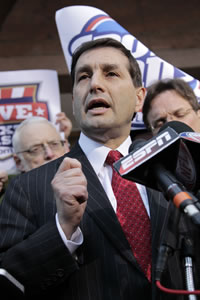There’s A Right Way To Negotiate

Wednesday - April 06, 2011
| Share
 Del.icio.us
Del.icio.us
|
With the NFL lockout now in its fourth week and with talks frozen until sometime after Judge Susan Nelson rules on the union’s injunction to block the lockout, the odds of any negotiation taking place before May is quite remote. Then again, it seems that very little meaningful discussion has occurred at all.
I can’t say whether the two sides were paying attention in December when the idea of mediation was raised in this very space, but they did the unthinkable and tried something new. Then they did the thinkable, barely putting in any real effort to make progress, which brings the two sides to where they are now - nowhere closer to solving their differences than they were six months ago.
The critical problem with the negotiations thus far has been that both sides seem intent on sticking to power positions instead of looking for ways to create added value for both parties. This is a big no-no according to Roger Fisher and William Ury in their influential guide to negotiation, Getting to Yes, Negotiating Agreement Without Giving In.
The two members of the Harvard Negotiation Project lay out four steps to get past conflicts that delay or prevent settlements; separate people from the problem; focus on interests, not positions; invent options for mutual gain and insist on using objective criteria.
It’s clear the warring parties don’t think very highly of each other. Both sides have for months used the media in an attempt to sway public opinion.
This can be an effective strategy if an employer is very protective of its public image or if employees are in a situation like the HECO workers who took a hit after going on strike the same day thousands of Oahu residents lost their power. Neither the NFL nor the players have this concern since the public is pretty much sick of both.
Being able to separate people from the problem isn’t easy. Regardless of experience or intent, each participant in a negotiation brings with them particular prejudices. Even if both sides are committed to finding a solution that moves them away from fixed sums to a position of increased mutual gain, cultural, professional and ethical differences can get in the way. And when things get contentious, as they have between the owners and the union, finding common ground is even more difficult. Called “reactive devaluation,” the mutual distrust means that any concession from one side is automatically devalued just because it comes from the other side. As Fisher and Ury write, “Ultimately ... conflict lies not in objective reality, but in people’s heads.”
And make no mistake about it, there is a lot of conflict in the heads of union chief DeMaurice Smith and NFL negotiator Jeff Pash. We saw this last week when Smith chided the league after the league made a $177 million deposit to complete its payment to a player benefit program. “NFL players would like to thank the NFL for issuing a press release touting their contractual and legal obligations,” he said.
Fisher and Ury write that when parties negotiate over positions, they lock themselves into those positions and that leads to a new interest in saving face. One way to get past the conflict is to quit attacking the other side’s position and instead look for the interests behind it. That is key, because as of yet both sides have been committed to advancing their position instead of exploring their interests.
Which fits with Fisher and Ury’s second point to focus on interests and not positions. The difference between the two is simple enough; a position is what you want and interest is why you want it. For example, the NFLPA does not want an 18-game season. That is their position. The reason they don’t want it, at least publicly, is health concerns. That is their interest.
No doubt the biggest mistake the NFL is making in reference to Getting to Yes is the failure to use objective criteria. Fisher and Ury say parties must “insist” on this type of cooperation. For more months than anyone can remember, the union has been asking the league to fully disclose its financial information. The league has refused until recently when it offered to submit an audited profitability data of the combined 32 teams to the union. The NFLPA rejected the offer saying it wanted audited information from each individual team. This information is critical. Without equal access to information, it will be very difficult for either side to move from its bottom-line positions to one that will expand economic opportunities for both parties. Which is what a negotiation is supposed to do.
One of the strongest weapons anyone has during a negotiation is the ability to simply walk away. Known as a BATNA (Best Alternative to Negotiated Agreement) this sets a minimum for what either side will agree to. Much like shopping for a new car, if the dealer cannot meet your target price, the best alternative could be going to another dealer or keeping the car you have. The only alternative to a negotiated agreement for the owners and the players is no NFL football.
With such a BATNA, the only option is to talk. How long that will take remains a mystery.
E-mail this story | Print this page | Comments (0) | Archive | RSS Comments (0) |
Most Recent Comment(s):













